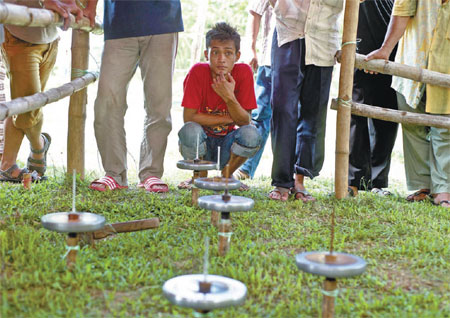Malaysia still spinning after centuries
In one fluid motion, Amri Aziz flings his oversized spinning top into the air and with a whip-like crack of rope sends it whirling for the next two hours.
That's when the tea is poured.
In a time-worn tradition, contestants and spectators settle down in Malaysia's Kelantan state to see whose meticulously hand-crafted top spins the longest in the centuries-old, slow-burn contest of "gasing uri".
Locals in the Muslim heartland of the country's rural east coast cheekily call the decades-old inter-state contest, held monthly with neighboring Terengganu, their "World Cup".
"In the olden days, this kind of game was very, very popular - like playing football is today," said Nazife Ismail, secretary of the Kelantan Gasing Uri Association.
But though many here still live in wooden huts, modern distractions like the Internet, video games and satellite broadcasts of European football games have penetrated.
That makes gasing uri a difficult sell for an impatient new generation whose interest is vital to keeping the unique tradition alive.
Today few take up the sport, which requires at least five years' training before one is considered ready for contests, in which local pride is the only reward.
"I got into it because my father and uncle taught me, but I keep on playing because when there are fewer players like today, you have a better chance to shine," Amri said.
The 22-year-old, whose disc of wood and tin weighs four kilograms, boasts bulging muscles developed by years of training with the ponderous tops, which typically measure 20 centimeters across.
Dexterity required
Despite its uneventful nature, the contest begins with an amazing feat of dexterity.
After the spinner launches his gasing (top), a "scooper" catches the plate-shaped object on a small wooden paddle just centimeters wide.
"Scooping is the most difficult job. It's like football: the goalie is the most important," said Hussain Mohamad, who has been spinning for over four decades.
Top-spinning - which developed in cultures worldwide - took hold in Malay society centuries ago as a way for men to pass the ample time available after the rice harvest.
Under age-old, pre-Islamic Malay animist beliefs, individual gasing were said to inherit the nature of the trees they were made from.
Other forms of gasing contests exist - including "gasing pangkah" where contestants smash their bulky, spinning tops against others, trying to topple them.
"If I can't play, I will lose my zest for life. Never mind work. We have to do this for one day a month from 10 am to 6 pm," Hussain said.
|
Amri Aziz watches his top spin during a local contest in Pasir Puteh, Malaysia, on Monday. By tradition, local contestants and spectators settle down to see whose hand-crafted top spins the longest in the centuries-old contest. Manan Vatsyayana / Agence France-Presse |



















